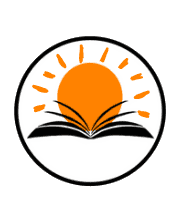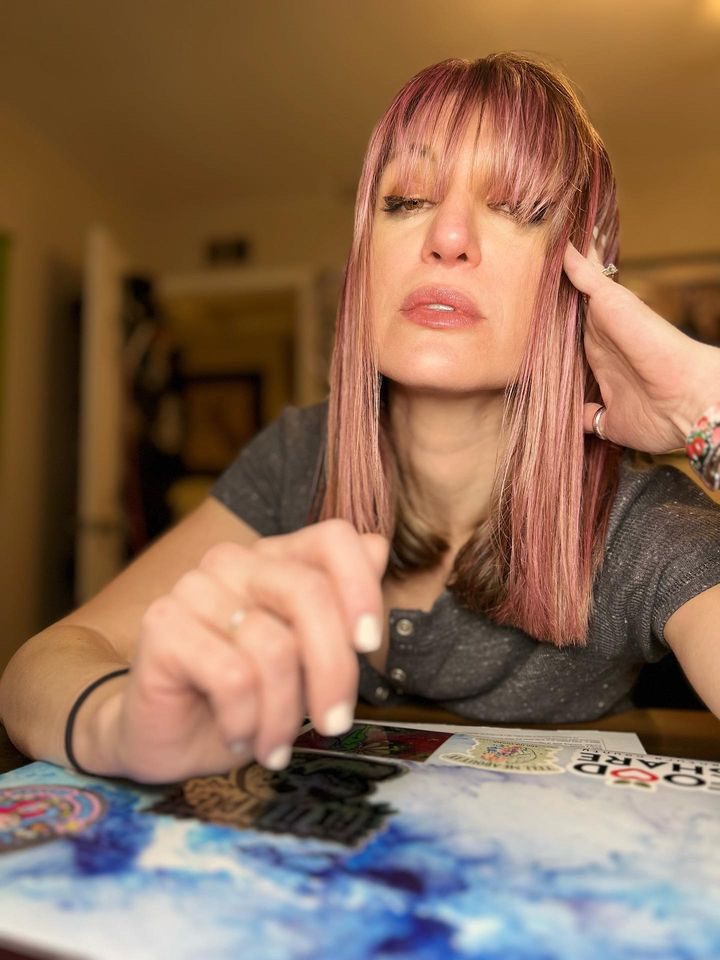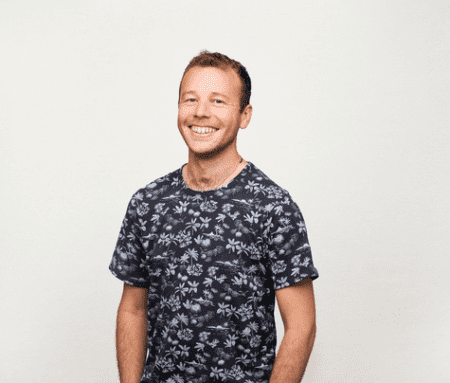We sat down with Los Angeles-based writer, Victoria Sayeg, to talk about her evolution as a published writer, copywriter, and all-around powerhouse.
Using small pencils she found in the pews, five-year-old Victoria began her writing career scribbling short stories on donation envelopes during Catholic mass as a form of escapism. A Los Angeles native, Victoria has since spent the last 30 years in the world of media and live theatre production, first as a child actor before finding her home behind the camera. Victoria has produced over 100 high-budget projects for various Fortune 500 companies, but that’s boring and doesn’t matter. She is proud to now spend her time advocating for youth arts education in her community by serving as Director of Media and Performing Arts for BRITE, a non-profit organization serving ten thousand transitional-aged youth every year. Through utilizing elements of performance, art, and poetry, Victoria strives to celebrate healthy/positive choices, mental wellness, diversity/cultural competency, and substance use/abuse prevention. Since 2008, Victoria has directed for the Young Artists Ensemble, a non-profit children’s theater organization in California. Alongside J.R.R. Tolkien and Ray Bradbury, Victoria is a three-time published playwright with Dramatic Publishing, where her shows can be produced globally. She’s written radio and broadcast television spots, short and feature-length screenplays, copy for major brands, several obituaries, and more champagne toasts than you could imagine. She’s traveled through the slam poetry circuit and has been featured on several storytelling podcasts, her favorite being Tenderfoot TV’s “Radio Rental” where she remembers the time she almost got murdered. She’s currently working on her first memoir. You can follow her pathetic Instagram account @vicosayeg.
Q: What have you learned about the writing process and/or your particular writing process?
A: I thought I always worked better under pressure and that was something I identified with and was proud of, but the older I got and the more I put myself through that process– it’s taxing! It’s physically taxing and emotionally taxing, and then I would have more obligations and stuff in my life where I realize like – what if I just tried time management? I had always thought that that would put a net around my creativity, but it doesn’t. It had actually opened me up to be able to reject some of the first thoughts that I had, because like – Wanda the Psychic Wombat and Farmageddon, that was all first thought, that’s all a first draft, and I got a little cocky! I got a little cocky when I drafted it, wrote it in a day, and then sold it to Dramatic Publishing, but then they started rejecting my content, and I was like “Okay, why are they rejecting it?” So I called meetings with the editor and asked her what I could do better, and her feedback was largely around the relatability of the content and what she felt like she could sell. So then that introduced me to the thought of “I can’t just write for me anymore. If I want to try and sell it, I should also understand the objectives that the publisher has.” So, I think I’ve learned that along the way. I’m also not as in love with my work as I used to be, which is great – I’m so happy throwing pages out and starting over.
Throwing things out is always the hardest part, I’m always like: but, my words!
I know! I feel that! One time I pulled something from being published when I was in college because they wouldn’t begin my last sentence with the word “and”, and they took out the period that connected the second to last sentence with the last sentence, and they made it one sentence. But, I didn’t write it like that and I did not want it like that. It read the way it needed to read. It was about standing at a red light at a crosswalk in Santa Monica and all these yuppy-rich people were waiting at the light and then a person experiencing homelessness just kind of went for it and walked, even though the light said not to, and everybody followed him. I wanted the beat there, but they ignored it, and I didn’t publish with them. But today, I would just get my name out and have them run it, you know?
It’s really interesting to see the different styles and boundaries of other peoples writing and how as writers, we’re so self-conscious, and then we share it and the reactions are so cool.
I forget that not everybody is a writer, you know? I do forget that in day-to-day life.
Writing is just so varied and personal, people forget that when we publish our work.
Do you feel like there’s pressure? I feel like there’s pressure around me! Even if like, when I worked in an office and a birthday card for someone in the office would come around and it lands on you. Everyone’s always like “Victoria’s the writer, she’ll write something,” and it’s for, like, Joe in accounting – I don’t know anything about him!
Q: Would you say your style of writing has evolved the more you’ve learned about the technical aspects of a story with structure and plot and narrative and all that?
A: You know, I can’t recommend enough Aaron Sorkin’s masterclass on screenwriting, that was really cool! When I realized that the three-act structure is to put your hero in a tree, throw a rock at him, and then help him down, that was enlightening. That also was enlightening in how I write longer narratives. I don’t think anything has been sacrificed by having a structure like I thought it would be, and that’s such a juvenile way to think – but it makes sense that I would think that. It makes sense that as a really young adult, and a kid coming of age, it makes sense to me why I would think “I don’t want your structure.” But that’s artistic license and liberty, to understand the structure and be like “Actually, what if I did this instead?” But, you have to have an understanding of it. It’s like – if you break a law, you have to know the law and the consequences. Even if it’s something as small as a rolling stop, you just know that technically you are breaking the law, and then you weigh it out.
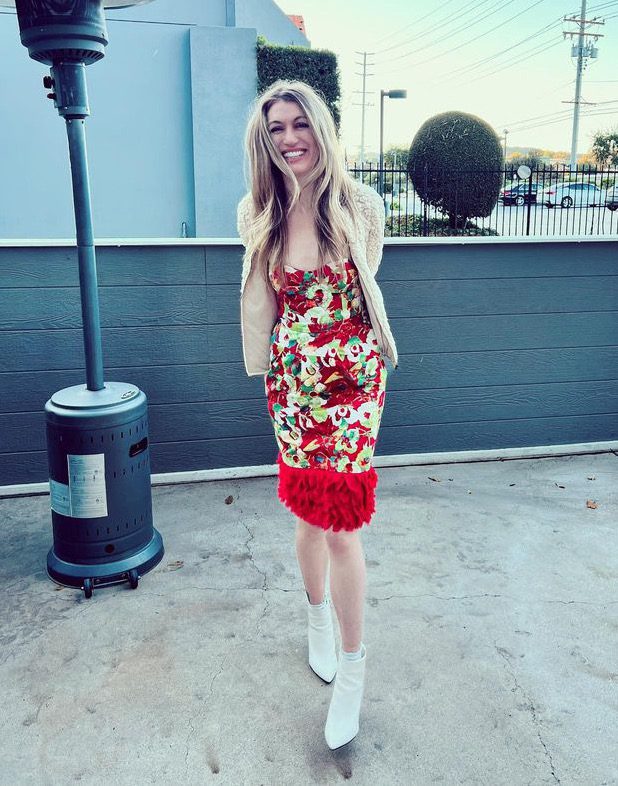
Q: What would you say has been your favourite piece you’ve written or a good experience you’ve had with a piece you’ve written?
A: I remember fondly, when I had time and energy, I was doing the spoken word and slam poetry circuit, there were a lot of really cool things that came with and out of that. I opened for Buddy Wakefield. That was cool! It was scary! I did a story on Radio Rental, which is a podcast narrated by Rain Wilson, and I told the story about when I almost died in a house I found on Craigslist. Yeah, that was fun! But, I also think that the pandemic brought out of me some poetry that was next level for me. I started to understand that writing from the scar and not the wound is the key. So, when I shifted that, I started actually enjoying my work, instead of feeling that it was just puke on paper. Poetry is still stigmatized I feel. Poetry is still in the mindset of, I think the aggregate is that ‘roses are red, violets are blue,” and it’s just – no. It actually is different.
One of my favourite poets at the moment very much shifted even how I see poetry. Her name is Topaz Winters and her poetry book, Portrait of my Body as a Crime I’m Still Committing, actually made me think of you and the viral Facebook post you wrote to Abercrombie and Fitch before the CEO stepped down and they shifted the company to be more size-inclusive. But, the title piece is all about how she wants to just be this entity without limbs and bones and to just be a soul without boundaries.
I relate to that feeling, because often as a kid, I’ve tried to explain to others, especially my brother, that I want to know what it would feel like if the inside of my elbow went over there (to the other side of the room). And, that’s a very abstract thing!
Q: How have editors helped you to further your work?
A: The first note from an editor that really hit me and stays with me is that he felt like I wasn’t being honest in my work, and he was right! I don’t know how he called it, I don’t know where that came from.
What piece was that with?
I was at a creative writing class at Moorpark College, and they do a monthly or yearly review thing, and it was something for that. I don’t remember what it was about – because I was mad. But now, I always think about that note! Now when I write, I always think about it like “Okay, Victoria, are you being honest? Is this honestly your truth? Is this the heart of what you’re saying?” and, it comes into my head all the time. I think the piece was about my fear of needles, and it had to do with how many surgeries I had as a youth, how many cosmetic reconstructive surgeries – optional not necessary. In retrospect, I think I was queuing it up in a way that made me feel okay with it? And I think he saw through that, like a fake smile almost.
Q: What would you say has been the biggest obstacle of your whole writing journey?
A: Oh, my damn self! Like, one hundred percent! No, but it’s – the biggest obstacle of my writing journey, I think I can actually put words around this – I have so much I want to tell, and I have so many people that would be mad at me if I told it. I wanna do memoir-style work and I want to do non-fiction. I have so many things that I’ve lived through that I want to share out, but all the people involved are still living, so. I don’t know what to do with that! I’ve heard people tell me before: “Don’t die with your book inside you”, but I’m like “If it comes out, a lot of people are gonna be mad at me.” So, that’s one obstacle. And then the other is just finding time, you know? Part of what I’m doing in April– I’m writing a book in April, it’s very exciting!– My friend is spearheading this whole writing competition, and the whole point is whoever writes the most words, wins. And it can be whatever, because the point is, words can be edited. You can’t edit what’s not on the page. So, that’s my plan. I bought a special desk because I heard that you should have a place to write that’s exclusively for you to write creatively. You don’t pay bills there, you don’t text there, you don’t do work there, you disconnect, don’t bring your phone with you, turn the internet off of your computer, and you just write. So, I bought a super cute desk, like a tv-tray that is a desk. It’s portable, it’s small, and I’m excited! Hopefully, if I’ve got the right desk, that’s all it takes!
Do you have an idea of what it’s going to be about?
I think I know what it’s going to be about, and I think it reflects the thing I think I’m currently perceiving as an obstacle, about people being alive. I want it to feel like – I don’t know if I’m doing this in a screenplay format or a novel format – but I want it to feel like Ladybird. The intent is that a 20-something wants to have a relationship and love her mom, and the obstacle is who they both are as people.
Q: How has the shift between writing for companies like Big Pharma to your current work with the non-profit changed your writing?
A: I have much more freedom now, and at a non-profit, I really do feel like the goal – this is such a side note, but I’ve been recently thinking about how the term ‘non-profit’ sucks because it talks about monetary and financial profit, but it’s in every other way, maybe the most profitable thing there is. So, I’m trying to come up with another way to explain that. But anyways, when I worked for Big Pharma and I wrote for them, it very much felt like hanging a lantern on and glorifying the words of big executive mucky-muck people for the sake of financial gain or to try to get people to think a certain way, believe a certain way, buy a certain thing. Now, it feels like all these words are being placed in specific orders to try to inspire the upcoming generations to create their own way of thinking and I try to think about what we do as laying a foundation and a platform and then holding a microphone and letting others amplify their own voices. Just providing a stage and some bumpers. It couldn’t be more different. I actually now write copy around opioid and fentanyl safety and prevention, whereas I used to write copy on the other side of it. So, it’s been an interesting run, and it feels much better too.
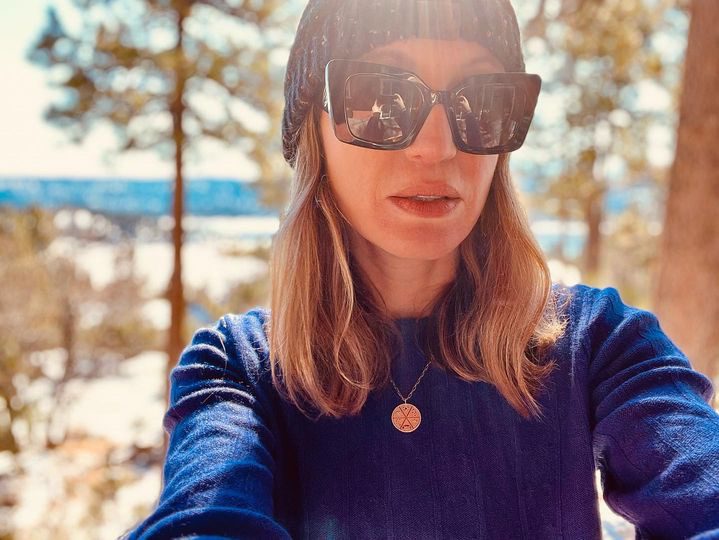
Q: Do you have a favourite project you’ve worked on through the non-profit?
A: Yeah, something that’s coming to mind right now is a project we called Bright Connections. It occurred during the very beginning of the pandemic, in lockdown. We’re grant-funded, and we’re grant-funded to work with so many people and count the number of people and the number of people worked with, so I needed to get a lot of people’s attention in a unique way. We worked with a couple of Moorpark College students who wrote a play and they had written this piece about self-harm. They wanted us to help put this play out into the world because it was important to them, because it was during the pandemic when mental health was suffering in everybody. So I read the play, and it was beautiful and poignant. There wasn’t a lot of dialogue in it. It was very cool. We helped them record it virtually, and we were going to share it out, but it didn’t feel right for me to open this door and put it into the universe without the aftercare or debriefing of it as a community. So, we started this thing which was like a live stream, where we presented this piece, and then there was a panel of supportive adult allies and the youth involved, therapists, schoolboard officials, doctors, all coming in to talk together and answer live questions from the community about what they just watched. Then we called it Bright Connections. The model was, every month, we would put a message from the youth out into the universe, and it was always a piece of art. One time, we had this person write a gender identity piece-poem, and we had an improvisational harpist play along with the reading of the poem, and then the panel of experts, and I moderated the whole thing. So, I wrote all the pieces in between and all the questions and all that, so it was still a lot of writing, but it wasn’t in any way about me. It was about all the other things. I really enjoyed that project. We did that every single month and were able to keep our jobs and meet our objectives. I think our job as creatives and writers is to just put it out there and then other people have to process it, and think about it, and talk about it for it to have its full act.
Q: What would be your one piece of advice for another creative or a lesson you learned and want to share?
A: I always feel like I have so much and nothing to say. Advice is a tricky thing, I feel like it’s personal. Blanket advice is just – look both ways? I don’t know. But, I think you get out of it what you put into it, and only you know where that line is, and only you know if you’re putting into it what you can and should and shouldn’t. Oh! Shout into the void. I got published because I just spent a week emailing everyone I could, finding everything I could find, and just sending out so many things. I got laws changed because I did that, I’ve gotten – My friend had Cerebral Ataxia, which is this thing that attacks your cerebellum and your brain, which is your motor movement, and unfortunately, she’s passed away, but in the beginning, the only thing we could do was take her to physical therapy. But, no one had any money. So I just started writing letters and emails to every physical therapy office in like a 70-mile radius of her house, and eventually, someone responded. I knew I had one gift, and that I could get some things out of that. So, I sat down, I spent time with it, nailed it out, and someone responded. They treated her for free for the rest of the time she was here. So, shout into the void, because the void is going to answer you.
